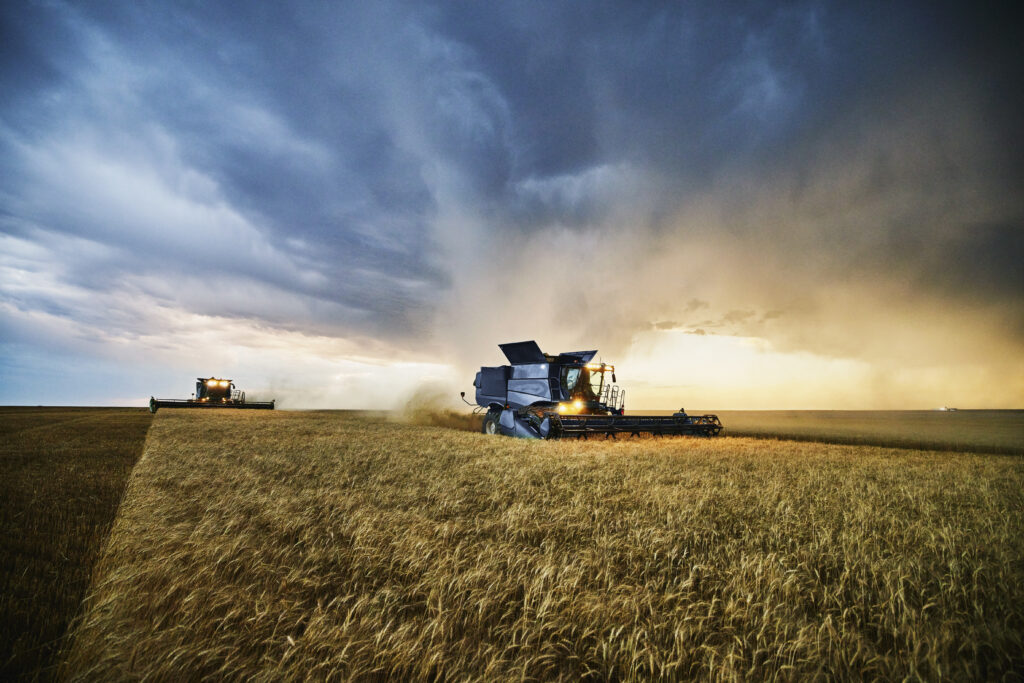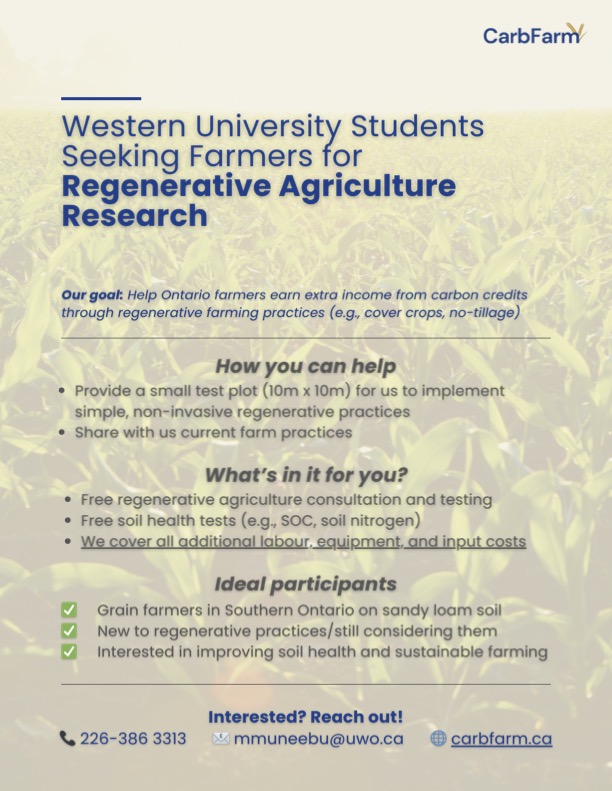A team of current students and recent graduates from Western University are seeking grain farmers from southern Ontario, particularly those located within Brant, Oxford and Norfolk counties, to participate in a pilot study surrounding regenerative agriculture.
CarbFarm, a student-led initiative, was created back in 2024 by three students from the university’s Ivey School of Business.
Now a six-person team, their aim is to test regenerative agricultural practices such as low-till farming, crop rotation and the use of cover crops, and identify which methods are most effective at storing carbon and increasing the healthy lifespan of the soil.
The end goal is to later promote said practices and incentivize farmers to implement them so that they can earn extra income from carbon credits and get the most out of their land.
Muhammad Muneeb Ur Rehman, a PhD student in Sociocultural Studies at Western’s School of Kinesiology and one of the students involved in the project, said the idea for CarbFarm came about during a class at the university.
“Our three co-founders had come together for a class, and they were looking at an exam case that they did on carbon credits in a prior semester. They were thinking about a business idea and they wondered, ‘well why hasn’t anyone done this yet?’” said Rehman. “They started looking into it and they found that it has been done in Europe and in the U.S., but that it hasn’t been done in a way that helps the farmers themselves rather than just the big corporations.”
With an idea underway, Rehman said the group got to work by building their plan and reaching out to as many farms as possible to see how many were already implementing some sort of sustainable agricultural practices.
“We talked to about 30 or so farmers in southern Ontario and found that only 19 per cent of the farms were implementing some sort of sustainable agriculture, but that they weren’t going full scale,” he said.

Rehman said they’re now looking for farmers who are new to regenerative practices or have been considering working them into their operations. The ideal candidate are grain farmers working on sandy loam soil who can provide a 10 by 10 metre plot of land, in use or not, for the pilot study.
“We’ll come and do soil tests to look at the carbon and nitrogen in the soil so that we have a baseline that is based on what their current practices are, then we’re going to take those 10 by 10 metre plots and start implementing some of those non-invasive regenerative practice,” he said. “So If they are already doing something like cover cropping, then we’ll look at how much they till, and if we reduce the amount of tillage, can we keep the carbon in the soil? Each farm will basically have a customizable plan based on what they are or not already doing and so the practices are going to look different for each of the farms involved.”
He said that the farmers involved won’t have to worry about a thing. The group will provide free regenerative agriculture consultation and testing, free soil health tests, and all additional labour, equipment and input costs will be covered.
“The biggest incentive here is that we will cover everything and the farmers won’t have to worry about anything, especially during the pilot test, which will run from September 2025 to April 2026,” said Rehman. “In addition to that they will have priority access to the first carbon credits that we are going to be selling. So in our business model, we’re going to be splitting the profits 50/50, and whatever share CarbFarm gets, will actually be reinvested back into expanding the program. As far as when the profits could come in, that could be starting in year one or in year five, it just depends where the carbon markets are because they’re currently very slow, so it may take some time.”

Understanding that this is something that could later expand throughout the rest of Ontario and even Canada, Rehman said it was important to have a knowledgeable team in place.
“We are a team of six people. Currently, we have two consultants who started CarbFarm and are helping us. We also have one researcher based out of the University of Guelph; she is amazing and she’s really been our go to person. We’re also planning to get another researcher as well,” he said. “We’re really trying to make sure that we build up the knowledge base that is needed for something like this. In terms of revenue stream, four of our team members all went to Ivey and they really understand what’s happening with the credits. Currently we’ve been following what Farm Credit Canada is doing in terms of their investments, and we are also following whatever is happening with Indigo and Microsoft as well.”
For those who may be interested in participating in the pilot study, they can email Rehan at mmuneebu@uwo.ca, or call 226-386-3313. For more information about the project and what it entails, visit: https://www.carbfarm.ca/
Kimberly De Jong’s reporting is funded by the Canadian government through its Local Journalism Initiative.The funding allows her to report rural and agricultural stories from Blandford-Blenheim and Brant County. Reach her at kimberly.dejong@brantbeacon.ca.